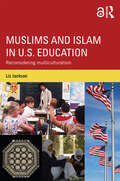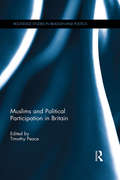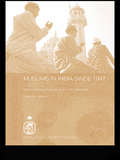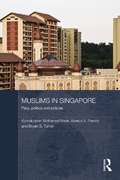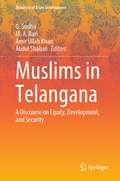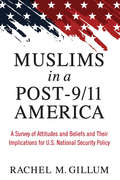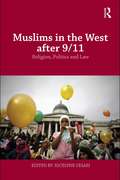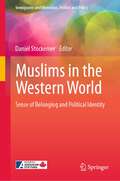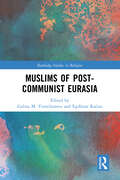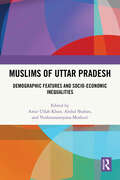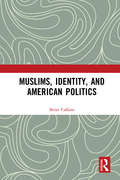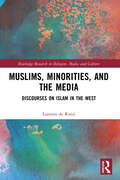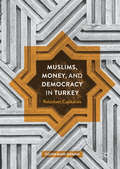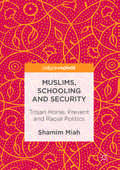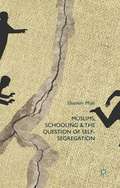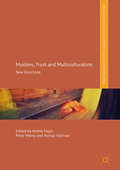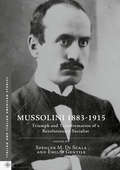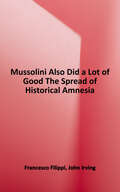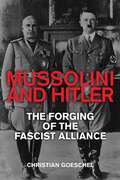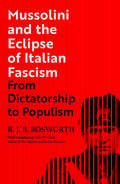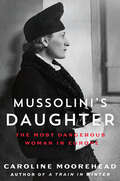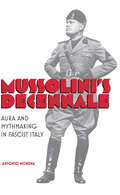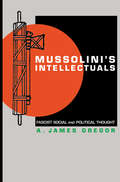- Table View
- List View
Muslims and Islam in U.S. Education: Reconsidering multiculturalism
by Liz JacksonWinner of Philosophy of Education Society of Australasia (PESA)'s inaugural PESA Book Awards in 2015, and The University of Hong Kong Research Output Prize for Education 2014-15. Muslims and Islam in U.S. Education explores the complex interface that exists between U.S. school curriculum, teaching practice about religion in public schools, societal and teacher attitudes toward Islam and Muslims, and multiculturalism as a framework for meeting the needs of minority group students. It presents multiculturalism as a concept that needs to be rethought and reformulated in the interest of creating a more democratic, inclusive, and informed society. Islam is an under-considered religion in American education, due in part to the fact that Muslims represent a very small minority of the population today (less than 1%). However, this group faces a crucial challenge of representation in United States society as a whole, as well as in its schools. Muslims in the United States are impacted by ignorance that news and opinion polls have demonstrated is widespread among the public in the last few decades. U.S. citizens who do not have a balanced, fair and accurate view of Islam can make a variety of decisions in the voting booth, in job hiring, and within their small-scale but important personal networks and spheres of influence, that make a very negative impact on Muslims in the United States. This book presents new information that has implications for curricula, religious education, and multicultural education today, examining the unique case of Islam in U.S. education over the last 20 years. Chapters include: Perspectives on Multicultural Education 9/11, the Media, and the New Need to Know Islam and Muslims in Public Schools Blazing a Path for Intercultural Education This book is an essential resource for professors, researchers, and teachers of social studies, particularly those involved with multicultural issues, critical and sociocultural analysis of education and schools; as well as interdisciplinary scholars and students in anthropology and education.
Muslims and Islam in U.S. Education: Reconsidering multiculturalism
by Liz JacksonWinner of Philosophy of Education Society of Australasia (PESA)'s inaugural PESA Book Awards in 2015, and The University of Hong Kong Research Output Prize for Education 2014-15. Muslims and Islam in U.S. Education explores the complex interface that exists between U.S. school curriculum, teaching practice about religion in public schools, societal and teacher attitudes toward Islam and Muslims, and multiculturalism as a framework for meeting the needs of minority group students. It presents multiculturalism as a concept that needs to be rethought and reformulated in the interest of creating a more democratic, inclusive, and informed society.Islam is an under-considered religion in American education, due in part to the fact that Muslims represent a very small minority of the population today (less than 1%). However, this group faces a crucial challenge of representation in United States society as a whole, as well as in its schools. Muslims in the United States are impacted by ignorance that news and opinion polls have demonstrated is widespread among the public in the last few decades. U.S. citizens who do not have a balanced, fair and accurate view of Islam can make a variety of decisions in the voting booth, in job hiring, and within their small-scale but important personal networks and spheres of influence, that make a very negative impact on Muslims in the United States. This book presents new information that has implications for curricula, religious education, and multicultural education today, examining the unique case of Islam in U.S. education over the last 20 years. Chapters include: Perspectives on Multicultural Education 9/11, the Media, and the New Need to Know Islam and Muslims in Public Schools Blazing a Path for Intercultural Education This book is an essential resource for professors, researchers, and teachers of social studies, particularly those involved with multicultural issues, critical and sociocultural analysis of education and schools; as well as interdisciplinary scholars and students in anthropology and education.
Muslims and Political Participation in Britain (Routledge Studies in Religion and Politics)
by Timothy PeaceThis new volume showcases the latest research into Muslim political participation both in terms of electoral politics and civil society initiatives. Muslims play a prominent role in British political life yet what do we actually know about the involvement of British Muslims beyond the existence of a handful of Muslim MPs? What is unique about political participation in Muslim communities? All the major parties actively seek to court a ‘Muslim electorate’ but does such a phenomenon exist? Despite the impact that Muslims have had on election campaigns and their roles in various political institutions, research on this topic remains scant. Indeed, much of the existing work was couched within the broader areas of the participation of ethnic minorities or the impact of race on electoral politics. The chapters in this volume address this lacuna by highlighting different aspects of Muslim participation in British politics. They investigate voting patterns and election campaigns, civil society and grassroots political movements, the engagement of young people and the participation of Muslims in formal political institutions. Written in an accessible style, this book will be of interest to students and scholars of political participation and religious studies.
Muslims in India Since 1947: Islamic Perspectives on Inter-Faith Relations (Royal Asiatic Society Books)
by Yoginder SikandMuslims in India today are responding to the challenge of religious pluralism in a variety of ways. This book explores the attempts being made by scholar-activists and Muslim organisations to develop new understandings of Islam to relate to people of other faiths and to the modern nation-state, and to deal with issues such as democracy and secularism. It examines how a common predicament, characterised by a sense of siege and the perception of being an oppressed minority, is producing new expressions of Islam, some of which seek to relate to non-Muslims in terms of confrontation, and others which call for dialogue, reconciliation and inter-faith harmony.
Muslims in Singapore: Piety, politics and policies (Routledge Contemporary Southeast Asia Series #26)
by Bryan S. Turner Kamaludeen Mohamed Nasir Alexius A. PereiraThis book examines Muslims in Singapore, analysing their habits, practices and dispositions towards everyday life, and also their role within the broader framework of the secularist Singapore state and the cultural dominance of its Chinese elite, who are predominantly Buddhist and Christian. Singapore has a highly unusual approach to issues of religious diversity and multiculturalism, adopting a policy of deliberately ‘managing religions’ - including Islam - in an attempt to achieve orderly and harmonious relations between different racial and religious groups. This has encompassed implicit and explicit policies of containment and ‘enclavement’ of Muslims, and also the more positive policy of ‘upgrading’ Muslims through paternalist strategies of education, training and improvement, including the modernisation of madrassah education in both content and orientation. This book examines how this system has operated in practice, and evaluates its successes and failures. In particular, it explores the attitudes and reactions of Muslims themselves across all spheres of everyday life, including dining and maintaining halal-vigilance; education and dress code; and practices of courtship, sex and marriage. It also considers the impact of wider international developments, including 9/11, fear of terrorism and the associated stigmatization of Muslims; and developments within Southeast Asia such as the Jemaah Islamiah terrorist attacks and the Islamization of Malaysia and Indonesia. This study has more general implications for political strategies and public policies in multicultural societies that are deeply divided along ethno-religious lines.
Muslims in Telangana: A Discourse on Equity, Development, and Security (Dynamics of Asian Development)
by Abdul Shaban G. Sudhir M. A. Bari Amir Ullah KhanThis book analyses the state of development of Muslims at the regional level. It explains the linkages between the findings of global, national, and state-level studies with regard to the current status of Muslims and broadens understanding of Muslims and their participation in virtually all major sectors, including the economy, housing, demography, health, migration, state policy, and affirmative action. The book presents the challenges faced by the community and reflects upon the socio-economic and educational conditions of Muslims in Telangana State. It presents a comparative analysis of mortality data, maternal health, delivery care, and child immunization, as well as reproductive health aspects and children’s nutritional status. It shares valuable insights into the impacts of emigration and internal migration on health among local Muslims and presents a detailed analysis of data from the Census of India, NSSO, and Commission of Inquiry on Socio-Economic and Educational Status of Muslims regarding the social, economic, and demographic situation of Muslims in Telangana, as well as their opportunities for development under the newly formed state government. The book would be of great interest to scholars and researchers in development economics, sociology, politics, history, cultural studies, minority studies, Islamic studies, and policy studies, as well as policymakers, civil society activists, and those working in media and journalism.
Muslims in a Post-9/11 America: A Survey of Attitudes and Beliefs and Their Implications for U.S. National Security Policy
by Rachel M GillumMuslims in a Post-9/11 America examines how public fears about Muslims in the United States compare with the reality of American Muslims’ attitudes on a range of relevant issues. While most research on Muslim Americans focuses on Arab Muslims, a quarter of the Muslim American population, Rachel Gillum includes perspectives of Muslims from various ethnic and national communities—from African Americans to those of Pakistani, Iranian, or Eastern European descent. Using interviews and one of the largest nationwide surveys of Muslim Americans to date, Gillum examines more than three generations of Muslim American immigrants to assess how segments of the Muslim American community are integrating into the U.S. social fabric, and how they respond to post-9/11 policy changes. Gillum’s findings challenge perceptions of Muslims as a homogeneous, isolated, un-American, and potentially violent segment of the U.S. population. Despite these realities, negative political rhetoric around Muslim Americans persists. The findings suggest that the policies designed to keep America safe from terrorist attacks may have eroded one of law enforcement’s greatest assets in the fight against violent extremism—a relationship of trust and goodwill between the Muslim American community and the U.S. government. Gillum argues for policies and law enforcement tactics that will bring nuanced understandings of this diverse category of Americans and build trust, rather than alienate Muslim communities.
Muslims in the West after 9/11: Religion, Politics and Law (Routledge Studies in Liberty and Security)
by Jocelyne CesariThis book is the first systematic attempt to study the situation of European and American Muslims after 9/11, and to present a comprehensive analysis of their religious, political, and legal situations. Since 9/11, and particularly since the Madrid and London bombings of 2004 and 2005, the Muslim presence in Europe and the United States has become a major political concern. Many have raised questions regarding potential links between Western Muslims, radical Islam, and terrorism. Whatever the justification of such concerns, it is insufficient to address the subject of Muslims in the West from an exclusively counter-terrorist perspective. Based on empirical studies of Muslims in the US and Western Europe, this edited volume posits the situation of Muslim minorities in a broader reflection on the status of liberalism in Western foreign policies. It also explores the changes in immigration policies, multiculturalism and secularism that have been shaped by the new international context of the ‘war on terror’. This book will be of great interest to students of Critical Security Studies, Islamic Studies, Sociology and Political Science in general. Jocelyne Cesari is an Associate at Harvard’s Center for Middle Eastern Studies and the Center for European Studies, teaching at Harvard Divinity School and the Government Department, specializing in Islam and the Middle East.
Muslims in the Western World: Sense of Belonging and Political Identity (Immigrants and Minorities, Politics and Policy)
by Daniel StockemerThis book provides an overview of the identity and sense of belonging of Muslims in the Western world. By presenting case studies on European countries such as France, the Netherlands and the UK, as well as the USA and Canada, it offers a comparative perspective on how Muslims feel toward and are integrated in their country of residence. The respective contributions examine the sense of belonging and identity of Muslims and compare their levels of integration. Furthermore, they discuss the compatibility of their religious beliefs and values with the political and democratic order of their country of residence, and make concrete policy recommendations. The book is chiefly intended for scholars of political science and migration studies who are seeking a comparative perspective on the status quo of Muslims’ integration in the Western world.
Muslims of Post-Communist Eurasia (Routledge Studies in Religion)
by Egdūnas Račius Galina M. YemelianovaThis book discusses the evolution of state governance of Islam and the nature and forms of local Muslims’ rediscovery of their ‘Muslimness’ across post-communist Eurasia. It examines the effects on the Islamic scene of the political and ideological divergence of Central and South-Eastern Europe from Russia and most of the Caucasus and Central Asia. Of particular interest are the implications of the proliferation of new, ‘global’ interpretations of Islam and their relationship with existing ‘traditional’ Islamic beliefs and practices. The contributions in this book address these issues through an interdisciplinary prism combining history, religious studies/theology, social anthropology, sociology, ethnology and political science. They analyse the greater public presence of Islam in constitutionally secular contexts and offer a critique of the domestication and accommodation of Islam in Europe, comparing these to what has happened in the international Eurasian space. The discussion is informed by the works of such thinkers as Talal Asad, Bryan Turner, Veit Bader, Marcel Maussen and Bassam Tibi, and utilises primary and secondary sources and ethnographic observation. Looking at how collectivities and individuals are defining what it means to be Muslim in a globalised Islamic context, this book will be of great interest to scholars of Religious Studies, Islamic Studies, Political Science, Sociology and Anthropology.
Muslims of Uttar Pradesh: Demographic Features and Socio-Economic Inequalities
by Abdul Shaban Amir Ullah Khan Venkatanarayana MotkuriThis book provides a comprehensive look into the development challenges and critical socio-economic issues of the Muslim communities in Uttar Pradesh—India’s most populous state and home to one of its largest Muslim populations. Well-known for its syncretic culture, benevolent kings and nawabs, Uttar Pradesh has also been a region that has historically experienced significant religious politics and communal violence. This book moves beyond these sectoral approaches and attempts to present a holistic, detailed, and contemporary perspective on the development of Muslims in the state. It traces the complex sectarian, caste-based, occupational, and regional diversities within the Muslim population in Uttar Pradesh and investigates the intersections of identity, social stratification, and development. Drawing on detailed empirical research, the volume explores critical issues such as educational and occupational mobility, health disparities, livelihood patterns, migration, and access to financial services. It highlights the persistent inequalities faced by Muslims in the state and examines how historical and contemporary processes including sectarian divides, caste hierarchies, political marginalisation, and policy shortcomings have shaped their current realities. This book, along with its companion volume Development Challenges of Muslims in Uttar Pradesh, will be of interest to students and researchers of politics, development studies, anthropology, human geography, sociology, and minority studies. It will also be of relevance to those in development administration, civil society organizations, and the general reader interested in development and deprivation in the state or Hindu-Muslim politics.
Muslims, Identity, and American Politics: Identity Community And National Attachment In Post-september 11th America
by Brian CalfanoCalfano provides an examination of the pressures faced by Muslims, often considered political and social outsiders in western nations, especially in the United States. Identity is a complex concept, especially when considering the role that group attachments play in affecting how one sees her/his role in the political environment of their country of residence. Perhaps the greatest tension in this regard is felt by those who are often considered outsiders in their home country, despite significant ties to their nation. Though citizens and second generation residents in many cases, American Muslims face a combination of suspicion, government scrutiny, and social segregation in the United States, despite significant education and economic assimilation in America. The crux of the investigation advanced here centres on how group influence, emotions, and religious interpretation contribute to the political orientation and behaviour of a national sample of Muslims living in the American context. A compelling explanation as to how members of an ostracized political group marshal the motivation to push through suspicion to become fully engaged political actors, this book has wide relevance and will be of interest to scholars researching Muslims and political participation across the fields of political science, history, sociology, and religion.
Muslims, Minorities, and the Media: Discourses on Islam in the West (Routledge Research in Religion, Media and Culture)
by Laurens de RooijInspired by overtly negative coverage by the Western mainstream press of Muslims in particular, and minorities in general, this book asks: Why are negative narratives and depictions of Muslims and other minorities so hard to change? News reports about Islam and Muslims commonly relate stories that discuss terrorism, violence or other unwelcome or irrational behaviour, or the lack of integration and compatibility of Muslims and Islam with Western values and society. Yet there is little research done on how studies on media reports about minorities seemingly fail to improve the situation. Combining empirical research with a structural analysis of the media industry, this volume presents evidence for the maligned representation of minorities by media corporations, analysing why negative narratives persist and outlining how these can be effectively transformed. It is an outstanding resource for students and scholars of media, religion, culture, sociology, and Islamic studies, and is also of benefit for journalists, media representatives, and activists looking to effect change for minority representation in the media industry specifically or in society at large.
Muslims, Money, and Democracy in Turkey: Reluctant Capitalists
by Özlem Madi-SismanThis book contextualizes the rise of a neo-Islamic Turkish bourgeoisie class with a particular reference to the relationship between Islam and Capitalism, and makes the argument for their ultimate compatibility . Additionally, the claim is made that the formation of this new socio-economic class has been detrimental to Turkey's efforts to consolidate its democracy. In order to analyze these processes, an Islamic-oriented young business group, Economic Entrepreneurship and Business Ethic Association (IGIAD), was taken as a case study. Drawing on fieldwork in examining IGIAD’S mission, vision, and activities, the book argues that such associations were born as a response to increasing tension between capitalism and Islam, with the aim of creating a ‘moral’ economy within global capitalism.
Muslims, Schooling and Security: Trojan Horse, Prevent and Racial Politics
by Shamim MiahThis book focuses on the recent educational policy debates surrounding Muslims, schooling and the question of security in light of the Counter Terrorism Security Act – which has made ‘Prevent’ a legal duty for schools, colleges and universities. The book examines the infamous ‘Trojan Horse’ affair in Birmingham, and critically evaluates the security discourses in light of theoretical insights from the study of racial politics. The sociology of race and schooling in the UK has long been associated with a number of diverse areas of study, including racial inequality, multiculturalism, citizenship and identity; however, until very recently, very little attention has been given to securitization and race within the context of education and even less focus has been given to the links between the question of security and racial politics. This book makes a much-needed and timely contribution to debates on the complex relationship between racial politics and schooling, and will make compelling reading for students and researchers in the fields of education and sociology, as well as education policy makers.
Muslims, Schooling and the Question of Self-Segregation
by Shamim Miah'Integration' or the supposed lack of it by British Muslims has been a ubiquitous feature in political, media and policy discourses over the past decades, often with little or no evidence base. This book is particularly timely as it draws on empirical research amongst both Muslim school students and parents to examine the question of 'self-segregation' in the light of key policy developments around 'race', faith and citizenship. It aims to contribute towards a national debate on segregation, schooling and Muslims in Britain through deconstructing the received wisdom of 'Muslim separateness'.
Muslims, Trust and Multiculturalism: New Directions (Palgrave Politics Of Identity And Citizenship)
by Peter Morey Asmaa Soliman Amina YaqinThis book critically engages with the contemporary breakdown of trust between Muslim and non-Muslim communities in the West. It argues that a crisis of trust currently hampers intercultural relations and obstructs full participation in citizenship and civil society for those who fall prey to the suspicions of the state and their fellow citizens. This crisis of trust presents a challenge to the plurality of modern societies where religious identities have come to demand an equal recognition and political accommodation which is not consistently awarded across Europe, especially in nations which view themselves as secular, or where Islamic culture is seen as alien. This volume of interdisciplinary essays by leading scholars explores the theme of trust and multiculturalism across a range of perspectives, employing insights from political science, sociology, literature, ethnography and cultural studies. It provides an urgent critical response to the challenging contexts of multiculturalism for Muslims in both Europe and the USA. Taken together, the contributions suggest that the institutionalisation of multiculturalism as a state-led vehicle for tolerance and integration requires a certain type of trustworthy ‘performance’ from minority groups, particularly Muslims. Even when this performance is forthcoming, existing discourses of integration and underlying patterns of mistrust can contribute to Muslim alienation on the one hand, and rising Islamophobia on the other.
Mussolini 1883-1915
by Emilio Gentile Spencer M. Di ScalaThis book describes Mussolini's little-known radical ideology, including his activities in Switzerland, relationship with revolutionary syndicalism, and radical journalism. It provides an in-depth treatment of the young Benito Mussolini as a revolutionary Socialist and describes the political maneuverings that took a major European Socialist party by storm before the First World War. It explains the process of how he came to dominate Italian Socialism until the crisis caused by Italy's intervention in World War I. It illuminates Mussolini's leadership qualities and his rise to leader of the Italian Socialist Party.
Mussolini Also Did a Lot of Good: The Spread of Historical Amnesia (Baraka Nonfiction)
by Francesco FilippiSurgically, but with wit, Francesco Filippi demolishes every myth that has taken root about Mussolini and fascism in an uplifting handbook for political and intellectual self-defense. No stones are left unturned, including the colonial devastation of Libya and Ethiopia. Legend would have it that Mussolini put roofs over Italians’ heads, developed the economy, had trains running on time, stood up for justice and against the mafia, protected the Jews from Nazi Germany, was a feminist, and put Italy on the map as a respected power. The founder of fascism’s only mistake was allying with Hitler. Though this is entirely false, it didn’t prevent Antonio Tahani, president of the European Union, from declaring in 2019 that “if we must be honest, he [Mussolini] did positive things to realize infrastructures … he reclaimed many parts of our Italy.” In fact, only 6 percent of the improvements referred to were done during the 21 years of fascist rule. Though written first for Italians, this book is relevant and timely for North Americans. Through a study of Mussolini and Italy, Filippi shows how such legends are built on webs of lies, manipulation of History, and constant uncontested repetition, explaining at the same time why so many people fall victim to the propaganda.
Mussolini and Hitler: The Forging of the Fascist Alliance
by Christian GoeschelThis fresh treatment of Fascist Italy and Nazi Germany reveals how the close relationship between Mussolini and Hitler influenced both men.From 1934 until 1944 Mussolini met Hitler numerous times, and the two developed a relationship that deeply affected both countries. While Germany is generally regarded as the senior power, Christian Goeschel demonstrates just how much history has underrepresented Mussolini’s influence on his German ally.A scholar of twentieth-century Germany and Italy, Goeschel revisits all of Mussolini and Hitler’s key meetings to examine how they constructed a powerful image of a strong Fascist-Nazi relationship that still resonates with the general public. His portrait of Mussolini draws on sources ranging beyond political history to reveal a leader who, at times, shaped Hitler’s decisions and was not the gullible buffoon he’s often portrayed as. The first comprehensive study of the Mussolini-Hitler relationship, this book is a must-read for scholars and anyone interested in the history of European fascism, World War II, or political leadership.
Mussolini and the Eclipse of Italian Fascism: From Dictatorship to Populism
by R. J. BosworthAn incisive account of how Mussolini pioneered populism in reaction to Hitler&’s rise—and thereby reinforced his role as a model for later authoritarian leaders On the tenth anniversary of his rise to power in 1932, Benito Mussolini (1883–1945) seemed to many the &“good dictator.&” He was the first totalitarian and the first fascist in modern Europe. But a year later Hitler&’s entrance onto the political stage signaled a German takeover of the fascist ideology. In this definitive account, eminent historian R.J.B. Bosworth charts Mussolini&’s leadership in reaction to Hitler. Bosworth shows how Italy&’s decline in ideological pre-eminence, as well as in military and diplomatic power, led Mussolini to pursue a more populist approach: angry and bellicose words at home, violent aggression abroad, and a more extreme emphasis on charisma. In his embittered efforts to bolster an increasingly hollow and ruthless regime, it was Mussolini, rather than Hitler, who offered the model for all subsequent authoritarians.
Mussolini in Ethiopia, 1919–1935
by Robert MallettMussolini in Ethiopia, 1919–1935 looks in detail at the evolution of the Italian Fascist regime's colonial policy within the context of European politics and the rise to power of German National Socialism. It delves into the tortuous nature of relations between the National Fascist Party and the National Socialist German Workers' Party (NSDAP), while demonstrating how, ultimately, a Hitler-led Germany proved the best mechanism for overseas Italian expansion in East Africa. The book assesses the emergence of an ideologically driven Fascist colonial policy from 1931 onwards and how this eventually culminated in a serious clash of interests with the British Empire. Benito Mussolini's successful flouting of the League of Nations' authority heralded a new dark era in world politics and continues to have its resonance in today's world.
Mussolini's Daughter: The Most Dangerous Woman in Europe
by Caroline MooreheadThe bestselling author of A Train in Winter returns with the definitive story of Mussolini&’s daughter, Edda, one of the most influential women in 1930s Italy, whose life had more twists and turns than a spy novel.Edda Mussolini was Benito's favourite child: spoiled and venal, uneducated but clever, faithless but flamboyant, a brilliant diplomat, wild but brave, and ultimately strong and loyal. For much of the twenty-year period of Fascist rule, she was her father's closest confidante.In 1930, at the age of nineteen, Edda married Count Galeazzo Ciano, who would become the youngest Foreign Secretary in Italian history. Acting as envoy to both Germany and Britain, Edda played a part in steering Italy to join forces with Hitler. During this time, the Cianos became the most celebrated and glamorous couple in elegant, vulgar Roman fascist society.Their fortunes turned in 1943, when Ciano voted against Mussolini in a plot to bring him down, and his father-in-law did not forgive him. Edda's dramatic story includes hidden diaries, her father's downfall and her husband's execution, and an escape into Switzerland followed by a period in exile. Moorehead draws a portrait of a complicated, bold, and determined woman—one who emerges not just as a witness but as a key player in some of the twentieth century's defining moments. And we see Fascist Italy with all its glamour, decadence and political intrigue, and the turbulence before its violent end.
Mussolini's Decennale
by Antonio MorenaThe year 1932, the tenth anniversary of Mussolini's March on Rome, was fascism's Decennale. Commemorating Italian fascism's seizure of power, the Decennale was celebrated by the regime in a deliberate attempt to radicalize the original movement and develop it into an imperial and racist regime.In Mussolini's Decennale, Antonio Morena explores a cross-section of Italian culture during the Decennale. Studying literature, speeches, documentaries, films, textbooks, and the 1932 Exhibition, he discusses how the regime, its patrons, and even its critics all appropriated the historical events of 1922 for their political advantage. Positioning the 1932 anniversary celebrations as the crux of the fascist transition from conservatism to totalitarianism, Mussolini's Decennale broadens our understanding of fascist ideology, cultural politics, and Realpolitik.
Mussolini's Intellectuals: Fascist Social and Political Thought
by A. James GregorFascism has traditionally been characterized as irrational and anti-intellectual, finding expression exclusively as a cluster of myths, emotions, instincts, and hatreds. This intellectual history of Italian Fascism--the product of four decades of work by one of the leading experts on the subject in the English-speaking world--provides an alternative account. A. James Gregor argues that Italian Fascism may have been a flawed system of belief, but it was neither more nor less irrational than other revolutionary ideologies of the twentieth century. Gregor makes this case by presenting for the first time a chronological account of the major intellectual figures of Italian Fascism, tracing how the movement's ideas evolved in response to social and political developments inside and outside of Italy. Gregor follows Fascist thought from its beginnings in socialist ideology about the time of the First World War--when Mussolini himself was a leader of revolutionary socialism--through its evolution into a separate body of thought and to its destruction in the Second World War. Along the way, Gregor offers extended accounts of some of Italian Fascism's major thinkers, including Sergio Panunzio and Ugo Spirito, Alfredo Rocco (Mussolini's Minister of Justice), and Julius Evola, a bizarre and sinister figure who has inspired much contemporary "neofascism." Gregor's account reveals the flaws and tensions that dogged Fascist thought from the beginning, but shows that if we want to come to grips with one of the most important political movements of the twentieth century, we nevertheless need to understand that Fascism had serious intellectual as well as visceral roots.
